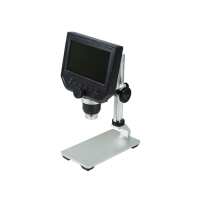
If you are looking for a high-quality and versatile microscope that can help you with your coin collection or soldering projects, you should check out this LCD digital microscope. This microscope has a built-in LCD display screen that lets you see the images directly without straining your eyes or neck.The LCD digital microscope has a 3.6 megapixels camera that can capture stunning photos and videos of your specimens. You can zoom in from 1x to 600x magnification to see every detail clearly. The microscope also has LED lights that provide adjustable illumination for different lighting conditions.The LCD digital microscope is ideal for inspecting coins and soldering because it has a metal stand that provides stability and flexibility. You can adjust the height and angle of the microscope to suit your needs. You can see the fine details of your coins or solder joints without any distortion.The LCD digital microscope can support a 64GB MicroSD HC card that can store hundreds of images and videos. You can also transfer them to your computer or share them online. The microscope is powered by a rechargeable battery that can last for hours of continuous use.The LCD digital microscope is a great tool for hobbyists, collectors, students, and professionals who want to explore the microscopic world with ease and convenience. It is easy to set up, use, and maintain. Order yours today and enjoy the benefits of this amazing device!Instruction ManualDM0205_Digital_Microscope__Instruction_Manual-English.docQuick OverviewFinite. Total Magnification: 1-600X. Track Stand. Illumination Type: LED Reflection Light. CCD. 3.6 Megapixels. Screen Size: 4.3in. Input Voltage: AC 100-240V 50/60Hz. Suggested ApplicationsCollecting , Coin & StampDM02050103 Digital MicroscopeOptical System SpecificationsOptical SystemFiniteTotal Magnification1-600XSystem Working Distance15mm-∞Track StandStand TypeTrack StandHolder Adapter Type Dia. 35mm Scope HolderTrack Length135mmBase TypeTable Base Base ShapeRectangleStand Throat Depth62.5mmBase Dimensions148x77x4.5mmFocus ModeManualFocus Distance115mmCoarse Focus Distance per Rotation19mmMicroscope Illumination SystemIllumination TypeLED Reflection LightLCD Display Digital CameraImage SensorCCDCamera Maximum Pixels3.6 MegapixelsCamera Resolution1920x1080Transmission Frame Rate30fpsExposure ControlManualImage Capture Output FormatJPEG Video Output FormatAVILanguageEnglish/French/Spanish/German/Italian/Simplified Chinese/Traditional Chinese/Japanese/Korean/Russian/Thai/Hebrew/Portuguese/Turkish/Czech/PolishMemory TypeTFMax. Supported Memory Card64GScreen Size4.3inScreen Aspect Ratio16:9Power SupplyInput VoltageAC 100-240V 50/60HzOutput VoltageDC 5VPower Cord Connector TypeUSA 2 PinsPower Cable Length0.7mOther ParametersMaterialPlasticColorBlackNet Weight0.56kg (1.23lbs)SeriesDM0205DM02050103
.tb_part
{
width: 100%;
border: solid 0px #ccc;
font-size:12px;
}
.tb_part tr
{
height: 30px;
line-height: 30px;
}
.tb_part td
{
white-space: nowrap;
}
.tb_part_1 td
{
white-space: wrap;
}
.normal{
border-left:solid 2px black;
border-right:solid 2px black;
}
.tb_part tr.normal td
{
border:solid 1px #ccc;
padding-right:5px;
}
.tb_part tr.normal:nth-child(2){
border-top:solid 2px black;
}
.tb_part tr.normal:first-child{
border:none;
}
.tb_part tr.normal:first-child td{
border:none;
font-weight:bold;
font-size:16px;
}
.end-border{
border-bottom:solid 2px black;
}
.tb_part tr.memo,.tb_part tr.memo td{
border:none;
}
Technical InfoInstructionsDigital MicroscopeClose ΛDigital microscope is the general term for microscope that can convert an optical image into a digital image, and usually does not specifically refer to a certain type of microscope. It should be noted however that most microscopes can be mounted with cameras and display devices to change to digital microscope. Microscopes in the visible range, from the digital imaging point of view, all use CCD or CMOS sensors to image the optical signal as an electric signal on a computer or display. However, the difference between various kinds of digital microscopes mainly comes from the optical microscope itself, so it is necessary to look at the imaging effect and function of the optical part in order to select the type of digital microscope.
From the classification point of view, digital microscopes can be divided into: digital biological microscopes, digital stereo microscopes, etc. It should be noted that due to the variety of lenses, ordinary lenses or microscopes, if mounted with a digital camera, can all become a digital microscope.
At present, the trend of digital microscopes is not only to present simple digital images, but to collect, process and analyze images through back-end software, especially for image measurement, comparison, judgment, and large-format scanning and splicing, and three-dimensional synthesis and so on, these aspects have been widely developed and applied. FiniteClose ΛMicroscopes and components have two types of optical path design structures. One type is finite optical structural design, in which light passing through the objective lens is directed at the intermediate image plane (located in the front focal plane of the eyepiece) and converges at that point. The finite structure is an integrated design, with a compact structure, and it is a kind of economical microscope. Another type is infinite optical structural design, in which the light between the tube lens after passing the objective lens becomes "parallel light". Within this distance, various kinds of optical components necessary such as beam splitters or optical filters call be added, and at the same time, this kind of design has better imaging results. As the design is modular, it is also called modular microscope. The modular structure facilitates the addition of different imaging and lighting accessories in the middle of the system as required. The main components of infinite and finite, especially objective lens, are usually not interchangeable for use, and even if they can be imaged, the image quality will also have some defects.
The separative two-objective lens structure of the dual-light path of stereo microscope (SZ/FS microscope) is also known as Greenough. Parallel optical microscope uses a parallel structure (PZ microscope), which is different from the separative two-object lens structure, and because its objective lens is one and the same, it is therefore also known as the CMO common main objective. Total MagnificationClose ΛTotal magnification is the magnification of the observed object finally obtained by the instrument. This magnification is often the product of the optical magnification and the electronic magnification. When it is only optically magnified, the total magnification will be the optical magnification.
Total magnification = optical magnification X electronic magnification Total magnification = (objective X photo eyepiece) X (display size / camera sensor target ) System Working DistanceClose ΛWorking distance, also referred to as WD, is usually the vertical distance from the foremost surface end of the objective lens of the microscope to the surface of the observed object. When the working distance or WD is large, the space between the objective lens and the object to be observed is also large, which can facilitate operation and the use of corresponding lighting conditions.
In general, system working distance is the working distance of the objective lens. When some other equipment, such as a light source etc., is used below the objective lens, the working distance (i.e., space) will become smaller.
Working distance or WD is related to the design of the working distance of the objective lens. Generally speaking, the bigger the magnification of the objective lens, the smaller the working distance. Conversely, the smaller the magnification of the objective lens, the greater the working distance. When it is necessary to change the working distance requirement, it can be realized by changing the magnification of the objective lens. Track StandClose ΛThroughout the focusing range, the track stand moves up and down along the guide rail through the focusing mechanism to achieve the purpose of focusing the microscope. This kind of structure is relatively stable, and the microscope is always kept moving up and down vertically along a central axis. When the focus is adjusted, it is not easy to shake, and there is no free sliding phenomenon. It is a relatively common and safe and reliable accessory. The size of the stand is generally small, flexible and convenient, and most of them are placed on the table for use, Therefore, together with the post stand, it is also called “desktop or table top stand". With regard to the height of the stand, most manufacturers usually do not make it very high. If the guide rail is long, it is easy to deform, and relatively more difficult . Stand Throat DepthClose ΛStand throat depth, also known as the throat depth, is an important parameter when selecting a microscope stand. When observing a relatively large object, a relatively large space is required, and a large throat depth can accommodate the object to move to the microscope observation center.LCD Display Digital CameraClose ΛLCD display digital camera is a combination of a digital camera and a display.CCDClose ΛCCD, charge coupled device.
See CCD and CMOS structure comparison table Camera Maximum PixelsClose ΛThe pixel is determined by the number of photosensitive elements on the photoelectric sensor of the camera, and one photosensitive element corresponds to one pixel. Therefore, the more photosensitive elements, the larger the number of pixels; the better the imaging quality of the camera, and the higher the corresponding cost. The pixel unit is one, for example, 1.3 million pixels means 1.3 million pixels points, expressed as 1.3MP (Megapixels). Camera ResolutionClose ΛResolution of the camera refers to the number of pixels accommodated within unit area of the image sensor of the camera. Image resolution is not represented by area, but by the number of pixels accommodated within the unit length of the rectangular side. The unit of length is generally represented by inch.Transmission Frame RateClose ΛFrame rate is the number of output of frames per second, FPS or Hertz for short. The number of frames per second (fps) or frame rate represents the number of times the graphics process is updated per second.
Due to the physiological structure of the human eye, when the frame rate of the picture is higher than 16fps, it is considered to be coherent, and high frame rate can make the image frame more smooth and realistic. Some industrial inspection camera applications also require a much higher frame rate to meet certain specific needs. The higher the resolution of the camera, the lower the frame rate. Therefore, this should be taken into consideration during their selection. When needing to take static or still images, you often need a large resolution. When needing to operate under the microscope, or shooting dynamic images, frame rate should be first considered. In order to solve this problem, the general industrial camera design is to display the maximum frame rate and relatively smaller resolution when viewing; when shooting, the maximum resolution should be used; and some cameras need to set in advance different shooting resolutions when taking pictures, so as to achieve the best results. PackagingClose ΛAfter unpacking, carefully inspect the various random accessories and parts in the package to avoid omissions. In order to save space and ensure safety of components, some components will be placed outside the inner packaging box, so be careful of their inspection. For special packaging, it is generally after opening the box, all packaging boxes, protective foam, plastic bags should be kept for a period of time. If there is a problem during the return period, you can return or exchange the original. After the return period (usually 10-30 days, according to the manufacturer’s Instruction of Terms of Service), these packaging boxes may be disposed of if there is no problem.
About Boli Optics:
Boli Optics Microscope Supplier sells professional microscopes, microscope accessories, and magnifying lamps. We offer parts and accessories compatible with Leica, Olympus, Nikon, and Zeiss, and more. We supply research laboratories, medical centers, universities, industrial manufactures, factories, and more. Our engineers and technicians provide technical support and design & manufacture custom microscope products for your applications. Our products are manufactured under ISO 9001 quality control standards. We also provide OEM service. Since 1994, our talented team has been working in the optics industry and serving our customers whole-heartedly. Based in Southern California, we offer fast, same day shipping from our local warehouses.
Visit Product PageEmail:
sales@bolioptics.com
Location:
8762 Lanyard Court,
Rancho Cucamonga
California
91730


